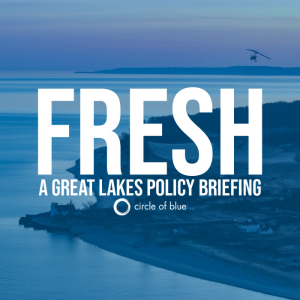Federal Water Tap, February 5: NSF Selects Water, Climate Innovation Hubs
The Rundown
- National Science Foundation invests potentially $1.6 billion in regional innovation hubs to address water, climate, and energy challenges.
- EPA proposes two new rules to prevent PFAS contamination of water sources.
- GAO reports cover precision agriculture, cybersecurity, and climate change’s consequences for nuclear sites abroad.
- EPA financial advisers will hold a public meeting on lowering the capital cost of water projects.
- U.S. Fish and Wildlife Service proposes new management rules for wildlife refuges.
- House subcommittee will hold a hearing on water sector cybersecurity.
And lastly, the FBI director testifies before Congress that China could target water systems and other civilian infrastructure in cyberattacks.
“They’re not focused just on political and military targets. We can see from where they position themselves across civilian infrastructure, that low blows aren’t just a possibility in the event of conflict, low blows against civilians are part of China’s plan.” – Christopher Wray, director of the FBI, speaking before the House Select Committee on the Chinese Communist Party. Wray said that too little public attention has been paid to the risks to American infrastructure during a conflict with China.
By the Numbers
$1.6 Billion: Potential investment, over the next decade, in 10 regional innovation “engines” that are expected to develop new technologies to address water, climate, and energy challenges. The money comes from the National Science Foundation. A six-state Great Lakes hub, led by the Chicago-based nonprofit Current, will bring together researchers, businesses, and local governments to investigate ways to extract useful chemicals from sewage. It will also nurture water technology startups and train workers for water jobs. A Colorado-Wyoming hub will focus on climate, water, and carbon monitoring; a Southwest hub led by Arizona State University will center on water security and renewable energy.
News Briefs
PFAS Rules
The Biden administration is proposing two new actions to prevent the spread of PFAS in the environment.
First, the EPA would require cleanup of the chemicals at the nation’s 1,740 facilities that treat, store, or dispose of hazardous waste.
The scope is constrained – it would apply only to hazardous waste facilities, not to all Superfund sites.
A second action would designate nine PFAS as “hazardous constituents.” The wording matters. The agency is not (yet) moving to designate them as “hazardous wastes.” The latter is a more encompassing definition that would prompt a slew of cleanup and handling requirements under the Resource Conservation and Recovery Act. But such a move could be forthcoming.
“The listing rule is a step in that direction,” notes a Marten Law briefing.
The two moves are in addition to actions the EPA has proposed under CERCLA, aka the Superfund law. The agency this spring intends to finalize a proposal to list PFOA and PFOS as hazardous substances under that law. Polluters can then be held responsible for cleanup costs.
Wildlife Refuges
In response to a changing climate, the U.S. Fish and Wildlife Service is proposing new ways of managing the nation’s 850-million-acre network of wildlife refuges.
The agency wants to update the framework for guarding biodiversity and environmental health at 570 refuges. It will reaffirm that conservation is the prime objective. And it will aim for consistent methods in how certain management actions – mosquito control, non-native species, and others – will be evaluated across refuges.
Other changes note that historical environmental conditions at a refuge may be considered a “reference point, rather than an end goal.” This means that management plans could adapt to the realities of a warmer planet – even if past conditions cannot be sustained.
Public comments are being accepted through March 4. Submit them via www.regulations.gov using docket number FWS-HQ-NWRS-2022-0106.
Studies and Reports
Climate Change and Legacy Nuclear Sites Abroad
Cold War-era nuclear waste from U.S. actions in Greenland, Spain, and the Republic of the Marshall Islands persists today. The Government Accountability Office looked at how a warming planet could affect these sites.
The report is most pointed on the Marshall Islands, where nuclear testing seeded a legacy of mistrust of the U.S. government. Islanders worry that rising seas could mobilize buried contaminants.
The report recommends that the Department of Energy, which is responsible for radiation monitoring in the atolls, develop a better strategy for communicating scientific information to the Marshallese.
Cybersecurity
The GAO also evaluated the Biden administration’s national cybersecurity strategy. It could be improved, the office concluded.
Published in March 2023, the strategy has five pillars, including protect critical infrastructure like water and wastewater systems.
While broadly approving of the strategy, the GAO wants more details on how outcomes will be measured and how implementation costs will be estimated.
Precision Agriculture
In a report mandated by Congress, the GAO reviewed precision agriculture. This is the use of new technologies – drones, sensors, specialized equipment – to grow crops with less strain on water, land, and air, and fewer inputs of fertilizers/pesticides.
What should policymakers be considering? The report offers some food for thought – how to spur innovation and encourage more farmers to adopt the tools. There is substantial room for improvement.
Though available for decades, precision tools are being used by only about a quarter of U.S. farms, according to federal data. Use is highest where large tracts of commodity crops are common: California, the Great Plains, the Corn Belt.
On the Radar
Water Sector Cybersecurity Hearing
On February 6, a House Homeland Security subcommittee will hold a hearing on cybersecurity for the water sector. Representatives from businesses and the water utility industry will testify.
Water Affordability Meeting
The Environmental Financial Advisory Board, which advises the EPA on financial matters, will hold a public virtual meeting to gather information on making drinking water and sewer services more affordable by lowering capital costs.
The meeting will be February 20, from 1:00 p.m. to 3:00 p.m. Eastern. Register here.
South Carolina’s Management of Federal Funds
The EPA Office of the Inspector General will begin an investigation of South Carolina’s capacity to manage federal infrastructure funding through its Clean Water State Revolving Fund.
Federal Water Tap is a weekly digest spotting trends in U.S. government water policy. To get more water news, follow Circle of Blue on Twitter and sign up for our newsletter.
Brett writes about agriculture, energy, infrastructure, and the politics and economics of water in the United States. He also writes the Federal Water Tap, Circle of Blue’s weekly digest of U.S. government water news. He is the winner of two Society of Environmental Journalists reporting awards, one of the top honors in American environmental journalism: first place for explanatory reporting for a series on septic system pollution in the United States(2016) and third place for beat reporting in a small market (2014). He received the Sierra Club’s Distinguished Service Award in 2018. Brett lives in Seattle, where he hikes the mountains and bakes pies. Contact Brett Walton







Leave a Reply
Want to join the discussion?Feel free to contribute!